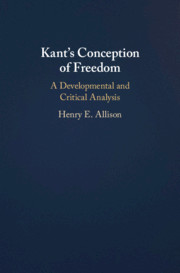Book contents
- Kant’s Conception of Freedom
- Kant’s Conception of Freedom
- Copyright page
- Dedication
- Contents
- Preface
- Acknowledgments
- Note on Sources and Key to Abbreviations and Translations
- 1 Kant’s Writings of the 1750s and the Place in Them of the Free Will Issue
- 2 Kant’s Theoretical Philosophy in the Early 1760s and Its Relation to His Conception of Freedom
- 3 Kant’s Moral Philosophy in the Early 1760s
- 4 Kant’s Dialogue with Rousseau Supplemented by His Dreams of a Spirit-Seer
- 5 From the “Great Light” to the “Silent Decade”: Kant’s Thoughts on Free Will 1769–1780
- 6 Kant’s Account of Free Will in the Critique of Pure Reason
- 7 From the Critique of Pure Reason to the Groundwork
- 8 The Fact of Reason and Freedom in the Critique of Practical Reason
- 9 The Critique of the Power of Judgment and the Transition from Nature to Freedom
- 10 Kant’s Final Thoughts on Free Will
- Bibliography
- Index
8 - The Fact of Reason and Freedom in the Critique of Practical Reason
Published online by Cambridge University Press: 19 December 2019
- Kant’s Conception of Freedom
- Kant’s Conception of Freedom
- Copyright page
- Dedication
- Contents
- Preface
- Acknowledgments
- Note on Sources and Key to Abbreviations and Translations
- 1 Kant’s Writings of the 1750s and the Place in Them of the Free Will Issue
- 2 Kant’s Theoretical Philosophy in the Early 1760s and Its Relation to His Conception of Freedom
- 3 Kant’s Moral Philosophy in the Early 1760s
- 4 Kant’s Dialogue with Rousseau Supplemented by His Dreams of a Spirit-Seer
- 5 From the “Great Light” to the “Silent Decade”: Kant’s Thoughts on Free Will 1769–1780
- 6 Kant’s Account of Free Will in the Critique of Pure Reason
- 7 From the Critique of Pure Reason to the Groundwork
- 8 The Fact of Reason and Freedom in the Critique of Practical Reason
- 9 The Critique of the Power of Judgment and the Transition from Nature to Freedom
- 10 Kant’s Final Thoughts on Free Will
- Bibliography
- Index
Summary
Kant begins the second Critique by explaining its title. Noting that the aim of the first Critique was to restrict the use of pure, i.e., a priori, reasoning to phenomena, and that this might suggest that its successor be termed a critique of pure practical reason rather than simply a critique of practical reason, he points out that its aim is to show that there is such a thing as pure practical reason and this requires a critique of reason’s entire practical capacity (KpV 5: 32–7; 139). As he did in the first Critique, Kant uses the term ‘critique’ in both its positive and negative senses. Taken positively, it means examining practical reason as a distinct source of a priori cognitions; whereas taken negatively it means examining the pretension of empirically conditioned practical reason, which presupposes given desires, to be the only legitimate use of practical reason. In other words, Kant’s negative target is the view that there is no such thing as a pure use of practical reason; just as his main target in the first Critique was an all-encompassing empiricism, which denies that there is any synthetic a priori knowledge.1 Since the practical function of reason is to determine the will, this means that Kant’s positive goal in the Analytic of Pure Practical Reason, which is the counterpart of the Transcendental Analytic in the first Critique, is to ground the claim that reason of itself can determine the will, which is to say that pure reason can be practical. But rather than providing a demonstration of this in the form of a deduction of the moral law/categorical imperative, as he attempted unsuccessfully in the Groundwork, Kant now claims that this capacity can be shown to be a fact, which he refers to as the “fact of reason.”
- Type
- Chapter
- Information
- Kant's Conception of FreedomA Developmental and Critical Analysis, pp. 350 - 410Publisher: Cambridge University PressPrint publication year: 2020



